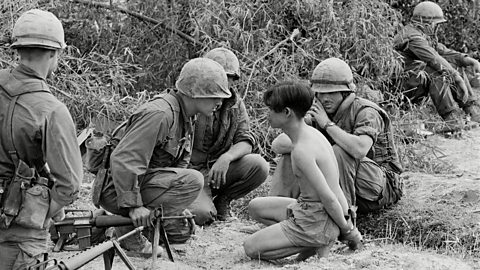Reasons for growing tension over Berlin
At the Yalta ConferenceA meeting of Churchill, Stalin and Roosevelt in 1945, where they planned the war’s end, the division of Germany into occupation zones and how post-war Europe should be organised. in 1945, Germany and its capital Berlin were both divided into four zones of occupation.
Berlin lay well inside the Soviet zone of occupation and was a source of tension throughout the Cold WarThe political tension and competition for power that existed between the communist East and the democratic West after World War Two. The two sides did not ever go to war. .
This had first become apparent in 1948 with the crisis over the Berlin BlockadeOne of the first Cold War crises when the Soviet Union blocked the Allies access to West Berlin in 1948. It ended in 1949 after daily western airlifts of supplies to their zones made continuing the Blockade pointless..
In the late 1950s, issues around Berlin sparked off one of the biggest of the Cold War crises.
The 'brain drain'?
Khrushchev and the East German authorities were concerned about the 'brain drain' from East Germany towards West Germany.
Question
What was the ‘brain drain?’
Many highly skilled people were able to escape the hardships of East Germany and East Berlin for the benefits of the capitalistThe economic idea that countries should be run based on private business, trade, stocks and shares, and profit. system which was to be found in West Germany and West Berlin.
This led to a lack of skilled, educated people in the Eastern sectors.
This movement of people became known as the ‘brain drain’.
Between 1949 and 1961, an estimated 2.7 million East Germans left for West Germany, and Berlin was the centre of this process.
This created a bad impression of life in East Germany under communistSomeone who believes in the political ideology of communism, a system of running a country in which all means of production such as tools, factories and raw materials, are owned by the community as a whole. Private property does not exist and each individual contributes according to their ability and receives according to their needs. This means there is no hierarchy of social class..
Khrushchev became so troubled with this situation that in November 1958 he gave a speech in Moscow in which he gave the West an ultimatum.
He demanded that, as Berlin lay in East Germany, the Western powers should withdraw their troops from Berlin within six months.
U2 plane incident
President Eisenhower did not want to give in to Khrushchev’s demands and believed a military presence was necessary to protect West Berlin’s freedom.
It was agreed to hold negotiations between the two superpowerCountries who have huge influence or strength, giving them significant global power..
On 1 May 1960, just thirteen days before the USA and the USSR were preparing to sit down for a summit meeting in Paris, an American U2 spy plane was shot down over the USSR.
The USA claimed the U2 plane was a weather monitoring plane that had lost its way.
However, film retrieved by the Soviets from the plane clearly indicated that the plane, piloted by Gary Powers, had been on a spying mission.
Again in June 1961, Khrushchev demanded that the Americans leave West Berlin.
President John F. Kennedy refused and on 25 July, increased America’s spending on weapons.
Consequences of the U2 plane incident
- America was embarrassed as it was shown to have lied about the U2 plane’s mission, and to be using methods of espionageThe act of spying or using spies to gather information. which were morally suspect. They no longer held the ‘moralConcerned with right and wrong behaviour. high ground’ in the Cold WarThe political tension and competition for power that existed between the communist East and the democratic West after World War Two. The two sides did not ever go to war. .
- Nothing was resolved on the issue of Berlin and it would remain a major source of tension in the Cold War.
- The relationship between the USA and the USSR deteriorated even further, heightening Cold War tensions.
The building of the Berlin Wall
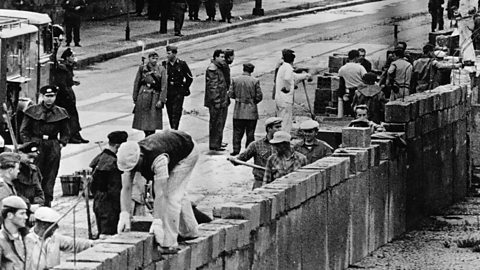
Relations between East and West got worse when Khrushchev responded to the West’s failure to follow his demands for them to leave Berlin.
On 13 August 1961 a barbed wire fence was erected along the border between East and West Berlin.
The wire would quickly be replaced by a concrete wall, complete with lookout towers and armed guards who had orders to shoot anyone trying to cross into the Western sector.
The Wall became a symbol of communistSomeone who believes in the political ideology of communism, a system of running a country in which all means of production such as tools, factories and raw materials, are owned by the community as a whole. Private property does not exist and each individual contributes according to their ability and receives according to their needs. This means there is no hierarchy of social class. oppressionExercise of authority or power in an unjust manner. and the most visible reminder of the distrust between East and West.
Question
Why was the Berlin Wall built?
- The brain drain: thousands of educated or highly skilled East Germans had fled to the West through Berlin, leaving behind the harsh political climate and economic hardship of life under communismA system of running a country in which all means of production such as tools, factories and raw materials, are owned by the community as a whole. Private property does not exist and each individual contributes according to their ability and receives according to their needs. This means there is no hierarchy of social class..
- Lure of the West: Initially, travel had been relatively easy between the Eastern and Western sectors of Berlin. People living under communism in the Eastern sector could visit the West and see what capitalismA system of running a country where most businesses are owned by private companies or individuals, not the government. offered. There was better housing, shops full of goods and relative freedom, all provided by the Western Allies.
- espionageThe act of spying or using spies to gather information.: Berlin was an ideal place for American spies to gather intelligence on the Soviet military.
- Imbalance in the Cold WarThe political tension and competition for power that existed between the communist East and the democratic West after World War Two. The two sides did not ever go to war. superpowerCountries who have huge influence or strength, giving them significant global power.: Khrushchev was very aware of the imbalance between the two sides in the Cold War. Nowhere was this more obvious than in Germany, where the Eastern part was always weaker than the prosperous West .
The response of the West
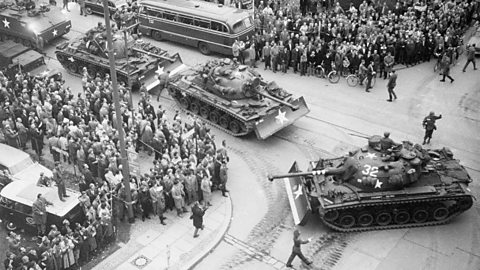
Once the Wall had been constructed, the US protested but effectively did nothing about it.
They were unwilling to risk war.
Though Kennedy chose not to challenge directly the Soviet Union's building of the Berlin Wall, he reluctantly resumed testing nuclear weaponAn extremely powerful explosive device that gets its energy from nuclear reactions. Nuclear weapons are much more powerful than even the largest non-nuclear bomb. Their explosions are so powerful that just one nuclear weapon is capable of completely destroying a city. Nuclear weapons also release huge amounts of radiation, which causes terrible illnesses for a very long time after the initial explosion. in early 1962.
The impact of the Wall on international relations
The Berlin Crisis (1959-61) was a time of quite considerable tension between the superpowerCountries who have huge influence or strength, giving them significant global power..
The shooting down of the U2 spy plane could have escalated into a very serious crisis.
In the end though, the wall symbolised the Cold WarThe political tension and competition for power that existed between the communist East and the democratic West after World War Two. The two sides did not ever go to war. itself and was a physical reminder of how poor relations were between the superpowers.
| The West | The USSR |
|---|---|
| Kennedy claimed a victory in that he had held onto West Berlin despite Khrushchev's requests for him to leave. | Khrushchev claimed a victory from the Berlin Wall crisis as he had fulfilled his original aim of reducing the flow of mainly highly skilled people from East Berlin. |
| Kennedy argued that if communismA system of running a country in which all means of production such as tools, factories and raw materials, are owned by the community as a whole. Private property does not exist and each individual contributes according to their ability and receives according to their needs. This means there is no hierarchy of social class. was so great, the Russians had no need to fence East Berliners in to prevent them moving towards the capitalistThe economic idea that countries should be run based on private business, trade, stocks and shares, and profit.west. |
Test your knowledge
More on International relations, 1945-2003
Find out more by working through a topic
- count6 of 13
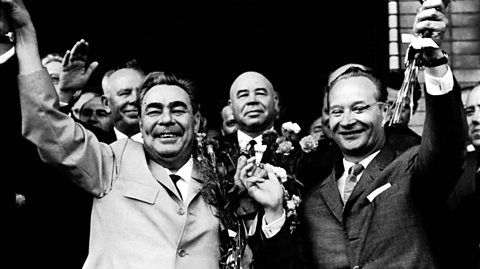
- count7 of 13
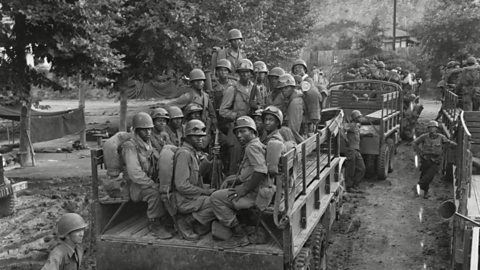
- count8 of 13
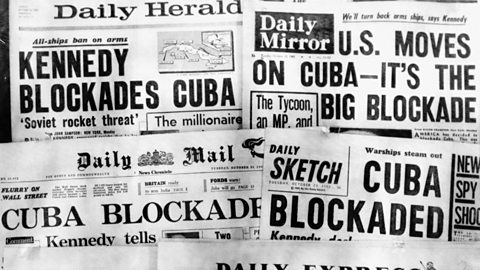
- count9 of 13
